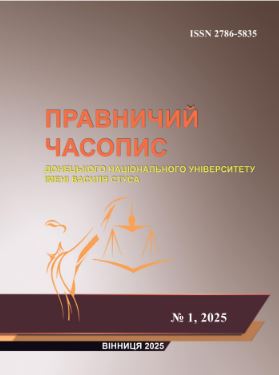Peculiarities of Formation and Development of the Right to Freedom of Religion in Legal Doctrines of the Middle Ages and Modern Times
DOI:
https://doi.org/10.31558/2786-5835.2025.1.2Keywords:
human rights, freedom, principles of law, right to freedom of religion, freedom of conscience, freedom of worldview, Middle Ages, Modern times, legal doctrine, legal doctrineAbstract
The article examines the peculiarities of the development of the right to freedom of religion from Middle Ages to modern times in various legal doctrines. The author shows that religious beliefs in ancient times were characterised by considerable tolerance. The perception of religion as something inherent in a particular nation or state was quite normal at that time. The deity was related to a particular community, and therefore there was every reason for freedom of religion in terms of tolerance of the beliefs of other nations. The author states that while in ancient times religious pluralism was necessary for the existence of an empire, in the Middle Ages, religious monism became an important tool for strengthening power. Augustine opposes freedom of religion because religion becomes intolerant of other faiths and democracy. Law and justice can exist properly only within the church.
The article highlights the position that the beginnings of the theory of popular sovereignty in Marsilius of Padua establish the theory of secular popular power, which does not require the participation of the Church for its implementation. The author concludes that L. Valla, as a representative of the school of humanism, revives the possibility of polemics between different world-views, even beyond Christianity.
It is established that law and Christianity become identical, justice is impossible outside its doctrine, and therefore, law and the state. M. Luther introduces and defends the principle of freedom of Christian worldview and deinstitutionalisation of Christian life. T. Münzer demonstrates the connection between the existing Christian structure of society and social inequality. As a result, there is an important tendency to democratise the social order, to implement the principle of equality, which has a positive impact on the development of religious freedom. It is found that J. Locke advocates the position that religion should move from the sphere of imperative, state coercion and public law relations to dispositivity, free choice and private relations.
References
Пайда Ю. Ю. Еволюція підходів до регулювання права на свободу світогляду та віросповідання у юридичній науці. Науковий вісник Дніпропетровського державного університету внутрішніх справ. 2018. № 4. С. 33–40.
The apology of Tertullian for the christians. Edited, with Introduction and Notes / T. H. Bindley, M. A., Merton College, Oxford. 1890. 180 p.
Новіков В. В. Історичні етапи еволюції свободи совісті. Наукові записки Львівського університету бізнесу та права. 2014. № 12. С. 269–274.
Бабій М. Віротерпимість, свобода совісті та свобода релігії й віросповідань в період становлення й утвердження християнства. Релігійна свобода. 2020. № 24. С. 10–19.
Marsilius of Padua The defender of peace / Austin P. Evans (ed.). Columbia University Press New York, 1951. 339 p.
Valla L. Of the True and the False Good. The Renaissance in Europe: An Anthology / ed. P. Elmer et. al. (Yale UP, 2000). P. 72–87.
Полешко А. В. Право на релігійну свободу: динаміка змісту поняття. Науковий вісник Ужгородського Національного Університету. Серія «Право». 2024. Вип. 82, ч. 1. С. 235–241.
Колиба М. М. Свобода віросповідання: філософсько-правовий вимір: дис. … д-ра філос. у сфері права. Львів. 2020. 248 с.
Колиба М. М. Свобода віросповідання як правова категорія у філософії мислителів епохи Відродження та Реформації. Митна справа. 2014. № 2(2.2). С. 41–46.
Олійник У. М. Специфіка формування парадигми права на свободу думки, совісті та релігії у філософії права доби Відродження та Реформації. Юридичний електронний науковий журнал. 2018. № 1. С. 224–227.
Мор Т. Утопія / пер. з лат. Й. Кобова. Київ: Дніпро, 1988. 209 с.
Davis D. H. The Evolution of Religious Freedom as a Universal Human Right: Examining the Role of the 1981 United Nations Declaration on the Elimination of All Forms of Intolerance and of Discrimination Based on Religion or Belief. BYU Law Review. 2002. Vol. 217. P 217–236.
Locke J. A Letter Concerning Toleration, in a letter concerning toleration in focus.(John Horton & Susan Mendus eds., 1991. 206 p.
Гоббс Т. Левіафан / пер. з англ. Київ: Дух і Літера, 2000. 606 с.

